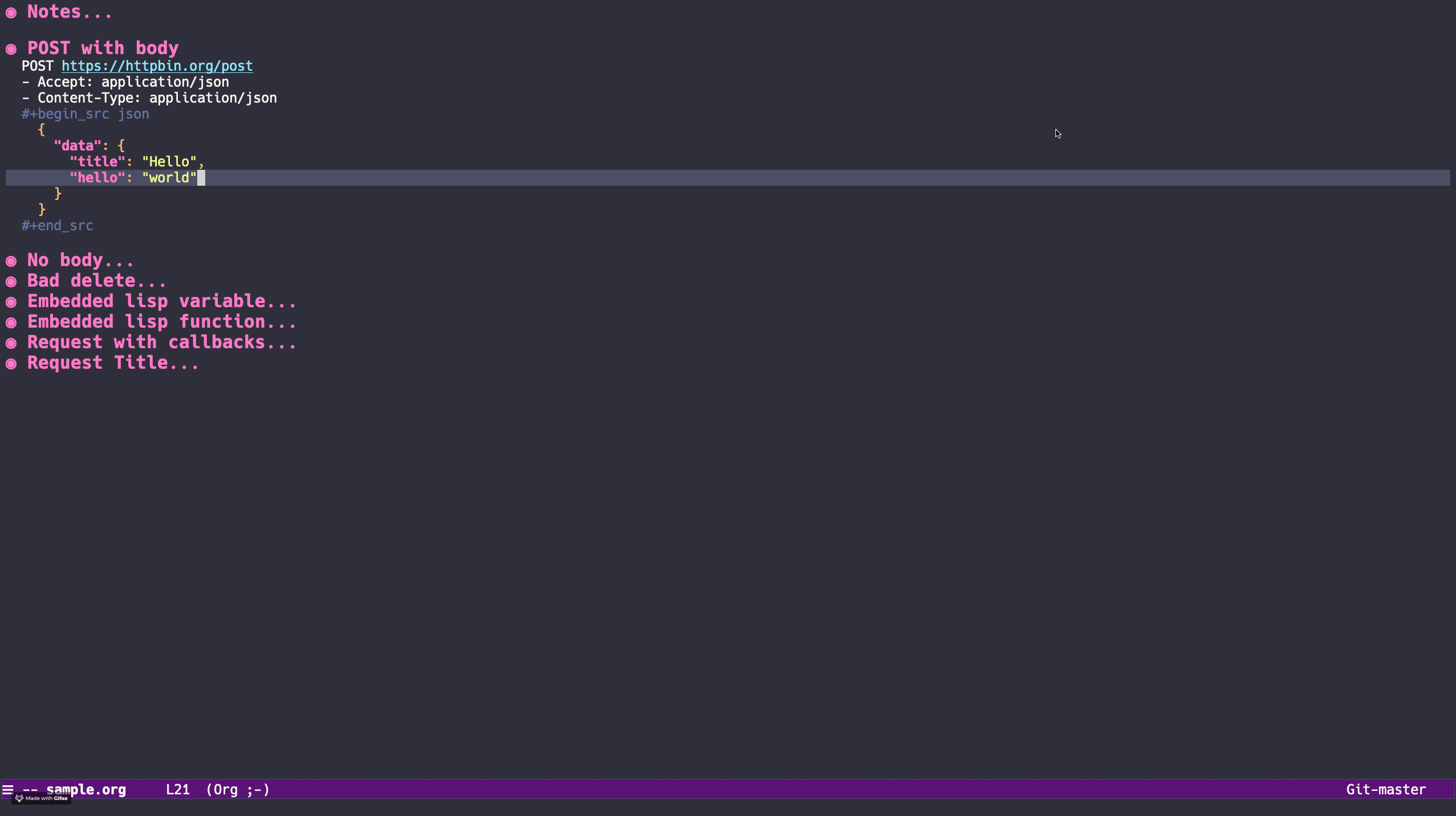Write HTTP requests in Org mode and replay them at will using cURL
- write HTTP requests as org mode "walkman entries"
- execute walkman entries via curl
- export walkman entries to a curl command
- import curl command to walkman entries (beta)
- support lisp variable or functions in a walkman entry
- execute a series of lisp callbacks, passing the status code, headers, and response body
Load up the walkman.el file.
By default, after calling M-x walkman-mode, these bindings will be added to org-mode:
C-c C-RETURN to execute the entry at point
C-c C-' for the walkman menu
C-c C-' c to copy the entry at point as a curl command
C-c C-' i to import a curl command and insert as walkman entry
See the sample.org file for example of walkman entries.
The general structure is
* Request Title
GET/POST/PUT/... URL
- Header1: value
- Header2: value
:FORM:
- type: document
- file: [[/home/user/document.jpg]]
:END:
#+begin_src
{
"body": "in any mode/format"
}
#+end_src
1. First Callback
#+begin_src emacs-lisp
(lambda (status headers body)
(message "status %s, headers %s, body %s" status headers body))
#+end_src
2. Second Callback
#+begin_src emacs-lisp
(lambda (status headers body)
(message "Second callback"))
#+end_src
Note that only the HTTP action and URL are required, everything else is up to you.
* Simple GET request
GET https://httpbin.org/get
* Simple POST request
POST https://httpbin.org/post
- Accept: application/json
- Content-Type: application/json
#+begin_src json
{
"data": {
"title": "Hello",
"hello": "world"
}
}
#+end_src
You can upload multipart document using the :FORM: Org drawer syntax:
* Multi part
POST https://httpbin.org/post
- Accept: application/json
:FORM:
- type: document
- file: [[/home/username/sample_document.jpg]]
:END:
will result in
curl --silent -i -X POST https://httpbin.org/post -F 'file=@/home/username/sample_document.jpg' -F 'type=document' -H 'Accept: application/json'Things to know:
- Headers inside the org drawer
:FORM:will be set with the curl-Fflag for form - org links to file will get their path prefixed with a
@ :FORM:headers must be AFTER regular headers for the parser to work properly
This is an example that will not work:
* Wrong multi part
POST https://httpbin.org/post
:FORM:
- file: [[/home/username/sample_document.jpg]]
:END:
- Accept: application/json
because the Accept header will not be parsed correctly.
Define my-http-status with
(setq my-http-status "400")OR specify a file variable and run
* Embedded lisp variable
GET https://httpbin.org/status/`my-http-status`
* Request with callbacks
POST https://httpbin.org/post
#+begin_src json
{
"some": "body"
}
#+end_src
1. First callback
#+begin_src emacs-lisp
(lambda (status headers body)
(message "status %s, headers %s, body %s" status headers body))
#+end_src
2. Second callback
#+begin_src emacs-lisp
(lambda (status headers body)
(pp (assoc 'url (json-read-from-string body))))
#+end_src
If you don't want to bother with the -v flag to keep the headers in the response buffer, you can do
(setq walkman-keep-headers t)
By default, running walkman-mode will run
(define-key org-mode-map (kbd "C-c C-'") #'walkman-transient)
(define-key org-mode-map (kbd "C-c <C-return>") #'walkman-at-point)
If you want to setup your own binding, don't run walkman-mode and instead bind
walkman-at-pointfor quick execution under the cursorwalkman-transientfor the transient-based interactive menu
- insert response in org doc?
- execute all requests sequentially
- unit tests
- option to run async
- multiple backends
